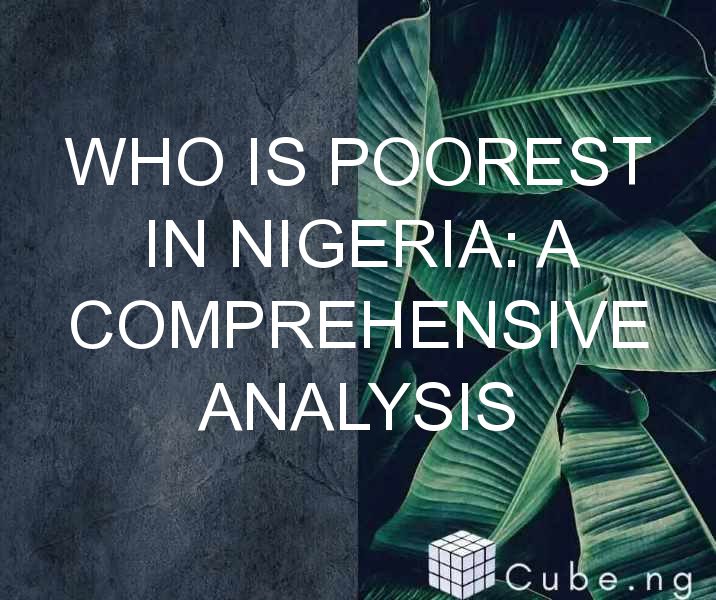Nigeria is not only the most populous country in Africa but also one of the richest in natural resources. However, despite having a vast amount of resources, Nigeria also has one of the highest poverty rates in the world. Poverty is a significant problem in the country, with millions of Nigerians living in extreme poverty. In this article, we will explore who is the poorest in Nigeria and the reasons behind this problem.
Table of Contents
Introduction
Poverty is a complex issue that has plagued Nigeria for many years. Despite its vast resources, the country has been unable to provide for its citizens adequately. The poverty rate in Nigeria stands at 40%, with over 83 million people living below the poverty line. Poverty in Nigeria is both rural and urban, affecting both the young and old.
Rural Poverty
Rural poverty is a significant problem in Nigeria. According to a report by the World Bank, over 80% of Nigeria's poor live in rural areas. This is primarily due to the lack of access to basic amenities such as healthcare, education, and infrastructure. The rural poor often lack access to clean water, adequate healthcare, and education, which are essential for human development. Additionally, many rural areas lack infrastructure, making it difficult for farmers to transport their goods to markets, resulting in low prices and poverty.
Urban Poverty
Urban poverty in Nigeria is a growing problem. As more people migrate to cities in search of better economic opportunities, the number of people living in slums continues to grow. According to the Nigerian Bureau of Statistics, over 60% of Nigerians live in slums or informal settlements. Many of these areas lack basic infrastructure such as electricity, clean water, and adequate sanitation. This, coupled with high unemployment rates, has resulted in a significant increase in urban poverty.
Youth Unemployment
Youth unemployment is a significant contributor to poverty in Nigeria. According to the Nigerian Bureau of Statistics, the unemployment rate for Nigerians aged 15-34 is 34.9%, which is higher than the national average. This has resulted in many young people being unable to find work, leading to poverty. Additionally, many of the jobs that are available are low-paying and offer no job security.
Women and Poverty
Women are also disproportionately affected by poverty in Nigeria. According to a report by UN Women, over 60% of Nigeria's poor are women. This is primarily due to societal and cultural norms that limit women's access to education, healthcare, and job opportunities. Additionally, women often have limited access to land and other resources, which makes it difficult for them to start businesses or engage in other income-generating activities.
Corruption
Corruption is another significant contributor to poverty in Nigeria. Nigeria is known for its high levels of corruption, with many public officials embezzling public funds. This has resulted in a lack of investment in essential infrastructure and services, making it difficult for people to escape poverty. Additionally, corruption has led to a lack of trust in government institutions, further exacerbating poverty.
Lack of Access to Education
Lack of access to education is also a significant contributor to poverty in Nigeria. Many children, particularly those in rural areas, lack access to education due to the lack of schools and teachers. Additionally, many families cannot afford to send their children to school, leading to a lack of education and limited job opportunities. This perpetuates the cycle of poverty, as children who do not receive an education are more likely to live in poverty as adults.
Lack of Access to Healthcare
Lack of access to healthcare is also a significant contributor to poverty in Nigeria. Many Nigerians, particularly those in rural areas, lack access to basic healthcare services. This results in untreated illnesses and preventable deaths, which further perpetuate poverty. Additionally, the cost of healthcare is often too high for many Nigerians, leading to a lack of treatment and further exacerbating poverty.
Ethnicity and Poverty
Ethnicity is also a significant contributor to poverty in Nigeria. Certain ethnic groups, such as the Hausa-Fulani and the Yoruba, are more likely to live in poverty than others. This is primarily due to historical and cultural factors, including access to education and job opportunities. Additionally, ethnic tensions and conflicts have resulted in displacement and further exacerbation of poverty.
Religion and Poverty
Religion is also a significant contributor to poverty in Nigeria. Many Nigerians, particularly those in the north, are Muslim, and poverty rates are higher in Muslim-majority areas. This is primarily due to a lack of education and job opportunities, as well as cultural norms that limit women's access to education and job opportunities.
Conclusion
Poverty is a significant problem in Nigeria, affecting millions of Nigerians. Factors such as rural poverty, urban poverty, youth unemployment, women's limited access to resources, corruption, lack of access to education and healthcare, ethnicity, and religion all contribute to poverty. The Nigerian government must take steps to address these issues and provide for its citizens adequately. By investing in essential infrastructure and services and providing job opportunities, Nigeria can work towards reducing poverty and providing a better future for its citizens.




